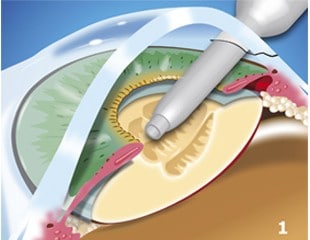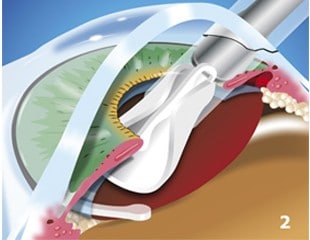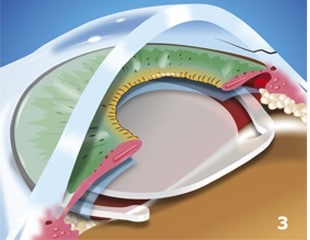What are Cataracts?
Cataract is a condition in which the lens of the eye gradually becomes cloudy and reduces the amount of light entering the eye, resulting in a gradual deterioration of vision.
The eye is like a camera, where the pupil controls light rays passing into the eye, much like the camera’s aperture. The lens is in the middle part of the eye, and focuses light entering the eye onto the retina, which is the light-sensing structure at the back of the eye, quite akin to the film of a camera. When the naturally clear lens becomes clouded, vision is reduced and becomes more foggy.
Fortunately, cataracts are highly treatable. With modern surgical technology, cataracts can be removed effectively with a safe procedure, allowing you to see more clearly again.
What Causes Cataracts?
A cataract is usually caused by the natural ageing process and occurs eventually in every elderly person, with 60% of the population experiencing this when they enter their 60s. It could sometimes also be caused by:
- Excessive UV light exposure
- Certain medical conditions e.g. diabetes
- Previous eye injury
- Chronic inflammation in the eye, i.e. uveitis
- Long-term use of specific medications, e.g. steroids
- A family history of cataracts, especially for cataracts which develop at an early age

Do You Experience Any of These Signs of Cataracts?
- Gradual blurring of vision that cannot be corrected despite wearing spectacles; alternatively, a continued change in spectacle prescription may signify the progression of the cataract
- Misty or foggy vision/ Things appear less focused
- Colours seem faded and things appear less bright i.e. reduced contrast
- Difficulty recognizing faces
- Glares and halos around lights e.g. from oncoming vehicles
- Poor night vision
- Difficulty with distance, intermediate or near vision
- A new ability for near tasks (e.g. reading), when previously unable to do so. This rather unexpected symptom happens when individuals who are shortsighted and presbyopic (lao hua) develop a cataract, as the cataract negates the effect of the presbyopia.

3 simple steps to getting your cataract surgery


How Does Your Ophthalmologist Check for Cataracts?
Cataracts are detected through a comprehensive eye test that includes:
- Visual Acuity Test
You will be asked to read letters on a vision chart – the smaller the letters you are able to read, the better your vision. - Subjective Refraction Assessment
This is an assessment of your glasses prescription, and can clarify if cataracts have altered your prescription in any way - Slit Lamp & Dilated Eye Examination
Eye drops are instilled to dilate your pupils, after which the ophthalmologist uses a special biomicroscope to examine the various structures in your eye in order to ensure that no other eye conditions, apart from your cataract, are contributing to your visual problems. A thorough examination of your eye also allows your surgeon to better plan your cataract surgery, if required.
How are Cataracts Treated?
If the cataract is mild and not causing significant visual problems and interference with daily activities, it may be perfectly alright to leave them be for the time being. Nonetheless, an initial assessment by an ophthalmologist is important as there are specific circumstances when cataracts may need to be monitored more closely. Follow-up is also important because as cataracts get worse, they alter the refractive state of your eye and so you may well need a change of glasses along the way.
Cataract surgery is usually recommended when the cataract is impairing vision and daily activities. Cataracts may also need to be removed if it is very dense and likely to cause complications such as angle closure disease, which is the broader spectrum of conditions including primary angle closure glaucoma.
What is Cataract Surgery like?
Cataract surgery is a safe, micro-incision, key-hole type procedure, performed under local anesthetic eye drops. During the procedure, the cataractous lens is removed in a process that usually takes less than 30 minutes.
This is a day surgery procedure with a relatively fast recovery – patients can resume most of their regular activities within a few days of the surgery. As with all surgical procedures, there can be some risks, which your surgeon will explain in detail prior to the surgery.
Modern cataract surgery is termed phacoemulsification, which is the preferred surgical technique for removing cataracts as it can be performed with smaller incisions compared with previous methods. The procedure is as follows:

A small incision, about 2mm to 3mm, is made at the edge of the cornea. The cataract is broken into small pieces with a phacoemulsification probe

The cataract is gently removed from the eye by suction

An artificial lens, also known as intraocular lens (IOL), is then implanted immediately. The incision often seals on its own without the need for stitches.
Read more about what to expect during the surgery in our FAQ below.
Selecting The Right Intraocular Lens For You
During the cataract surgery, your clouded lens will be replaced with an intraocular lens (IOL), which takes on the function of the natural crystalline lens. There is a wide array of intraocular lenses available, mainly categorised into 3 types – monofocal IOL, multifocal IOL and toric IOL – each with its benefits. After a joint discussion with you, our eye specialist will select an IOL suited for the needs of your eye (a specific prescription will be chosen to allow you to achieve good vision).
Read more about the benefits of each Intraocular Lens (IOL) and for whom each type of IOL is suitable in this article.
Need to Consult a Cataract Surgeon?

Dr Daphne Han
Medical Director
MBBS (Melbourne), MMed (NUS), FRCS (Edinburgh), FAMS (Ophthalmology)
Subspecialty: Laser Vision Correction and Lens Implant Surgery

Dr Errol Chan
Consultant
FRCSEd, FRCOphth, FRCS(Glasg), FAMS, FRCS(Canada)
Subspecialty: Cataract Surgery, General Ophthalmology, Macular Degeneration, Diabetic Eye Disease, Vitreoretinal Surgery, Uveitis

Dr Wong Chee Wai
Senior Consultant
MBBS (Singapore), M.Med (OPHTH), FAMS (Ophth), MCI (SINGAPORE), PHD (UTRECHT)
Subspecialty: Retinal Conditions, Floaters & Flashes in Vision, Age-Related Macular Degeneration, Myopia in Children & Adults Cataracts
Request for an Appointment
Common Questions on Cataract Surgery:
In individuals who have done LASIK previously, there is a reduction in the predictability of the treatment outcome for cataracts, due to the cornea curvature. However, our specialists are experienced to manage such cases.
Also, apart from the general cataract condition, there is a wide range of unique and complicated cases such as post-traumatic, subluxed, posterior polar and phacomorphic cataracts. At LSC Eye Clinic, we manage such conditions too.
As cataract surgery is a day surgery, you will be going home after your procedure. Therefore, do have a friend or family member to accompany you home from the clinic after. Upon reaching home, rest your eyes as much as possible, taking care to avoid the use of mobile phones and watching TV, as your operated eye will feel tired and gritty.Thereafter, your vision might be slightly misty for two to three days after surgery. It typically takes a few days for your eye to adjust after the operation and to experience an improvement in how you see. Read more on all you need to know about cataract surgery.




